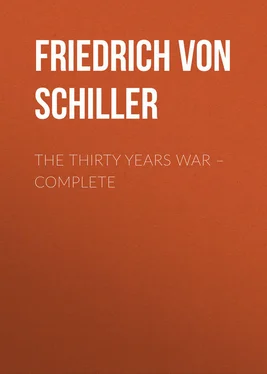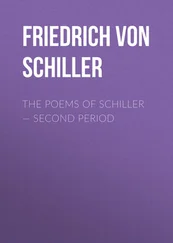Friedrich Schiller - The Thirty Years War – Complete
Здесь есть возможность читать онлайн «Friedrich Schiller - The Thirty Years War – Complete» — ознакомительный отрывок электронной книги совершенно бесплатно, а после прочтения отрывка купить полную версию. В некоторых случаях можно слушать аудио, скачать через торрент в формате fb2 и присутствует краткое содержание. Жанр: История, literature_18, foreign_antique, foreign_prose, на английском языке. Описание произведения, (предисловие) а так же отзывы посетителей доступны на портале библиотеки ЛибКат.
- Название:The Thirty Years War – Complete
- Автор:
- Жанр:
- Год:неизвестен
- ISBN:нет данных
- Рейтинг книги:5 / 5. Голосов: 1
-
Избранное:Добавить в избранное
- Отзывы:
-
Ваша оценка:
- 100
- 1
- 2
- 3
- 4
- 5
The Thirty Years War – Complete: краткое содержание, описание и аннотация
Предлагаем к чтению аннотацию, описание, краткое содержание или предисловие (зависит от того, что написал сам автор книги «The Thirty Years War – Complete»). Если вы не нашли необходимую информацию о книге — напишите в комментариях, мы постараемся отыскать её.
The Thirty Years War – Complete — читать онлайн ознакомительный отрывок
Ниже представлен текст книги, разбитый по страницам. Система сохранения места последней прочитанной страницы, позволяет с удобством читать онлайн бесплатно книгу «The Thirty Years War – Complete», без необходимости каждый раз заново искать на чём Вы остановились. Поставьте закладку, и сможете в любой момент перейти на страницу, на которой закончили чтение.
Интервал:
Закладка:
Friedrich Schiller
The Thirty Years War – Complete
HISTORY OF THE THIRTY YEARS’ WAR IN GERMANY.
PREFACE TO THE SIXTH EDITION
The present is the best collected edition of the important works of Schiller which is accessible to readers in the English language. Detached poems or dramas have been translated at various times since the first publication of the original works; and in several instances these versions have been incorporated into this collection. Schiller was not less efficiently qualified by nature for an historian than for a dramatist. He was formed to excel in all departments of literature, and the admirable lucidity of style and soundness and impartiality of judgment displayed in his historical writings will not easily be surpassed, and will always recommend them as popular expositions of the periods of which they treat.
Since the publication of the first English edition many corrections and improvements have been made, with a view to rendering it as acceptable as possible to English readers; and, notwithstanding the disadvantages of a translation, the publishers feel sure that Schiller will be heartily acceptable to English readers, and that the influence of his writings will continue to increase.
THE HISTORY OF THE REVOLT OF THE NETHERLANDS was translated by Lieut. E. B. Eastwick, and originally published abroad for students’ use. But this translation was too strictly literal for general readers. It has been carefully revised, and some portions have been entirely rewritten by the Rev. A. J. W. Morrison, who also has so ably translated the HISTORY OF THE THIRTY YEARS WAR.
THE CAMP OF WALLENSTEIN was translated by Mr. James Churchill, and first appeared in “Frazer’s Magazine.” It is an exceedingly happy version of what has always been deemed the most untranslatable of Schiller’s works.
THE PICCOLOMINI and DEATH OF WALLENSTEIN are the admirable version of S. T. Coleridge, completed by the addition of all those passages which he has omitted, and by a restoration of Schiller’s own arrangement of the acts and scenes. It is said, in defence of the variations which exist between the German original and the version given by Coleridge, that he translated from a prompter’s copy in manuscript, before the drama had been printed, and that Schiller himself subsequently altered it, by omitting some passages, adding others, and even engrafting several of Coleridge’s adaptations.
WILHELM TELL is translated by Theodore Martin, Esq., whose well-known position as a writer, and whose special acquaintance with German literature make any recommendation superfluous.
DON CARLOS is translated by R. D. Boylan, Esq., and, in the opinion of competent judges, the version is eminently successful. Mr. Theodore Martin kindly gave some assistance, and, it is but justice to state, has enhanced the value of the work by his judicious suggestions.
The translation of MARY STUART is that by the late Joseph Mellish, who appears to have been on terms of intimate friendship with Schiller. His version was made from the prompter’s copy, before the play was published, and, like Coleridge’s Wallenstein, contains many passages not found in the printed edition. These are distinguished by brackets. On the other hand, Mr. Mellish omitted many passages which now form part of the printed drama, all of which are now added. The translation, as a whole, stands out from similar works of the time (1800) in almost as marked a degree as Coleridge’s Wallenstein, and some passages exhibit powers of a high order; a few, however, especially in the earlier scenes, seemed capable of improvement, and these have been revised, but, in deference to the translator, with a sparing hand.
THE MAID OF ORLEANS is contributed by Miss Anna Swanwick, whose translation of Faust has since become well known. It has been. carefully revised, and is now, for the first time, published complete.
THE BRIDE OF MESSINA, which has been regarded as the poetical masterpiece of Schiller, and, perhaps of all his works, presents the greatest difficulties to the translator, is rendered by A. Lodge, Esq., M. A. This version, on its first publication in England, a few years ago, was received with deserved eulogy by distinguished critics. To the present edition has been prefixed Schiller’s Essay on the Use of the Chorus in Tragedy, in which the author’s favorite theory of the “Ideal of Art” is enforced with great ingenuity and eloquence.
BOOK I
From the beginning of the religious wars in Germany, to the peace of Munster, scarcely any thing great or remarkable occurred in the political world of Europe in which the Reformation had not an important share. All the events of this period, if they did not originate in, soon became mixed up with, the question of religion, and no state was either too great or too little to feel directly or indirectly more or less of its influence.
Against the reformed doctrine and its adherents, the House of Austria directed, almost exclusively, the whole of its immense political power. In France, the Reformation had enkindled a civil war which, under four stormy reigns, shook the kingdom to its foundations, brought foreign armies into the heart of the country, and for half a century rendered it the scene of the most mournful disorders. It was the Reformation, too, that rendered the Spanish yoke intolerable to the Flemings, and awakened in them both the desire and the courage to throw off its fetters, while it also principally furnished them with the means of their emancipation. And as to England, all the evils with which Philip the Second threatened Elizabeth, were mainly intended in revenge for her having taken his Protestant subjects under her protection, and placing herself at the head of a religious party which it was his aim and endeavour to extirpate. In Germany, the schisms in the church produced also a lasting political schism, which made that country for more than a century the theatre of confusion, but at the same time threw up a firm barrier against political oppression. It was, too, the Reformation principally that first drew the northern powers, Denmark and Sweden, into the political system of Europe; and while on the one hand the Protestant League was strengthened by their adhesion, it on the other was indispensable to their interests. States which hitherto scarcely concerned themselves with one another’s existence, acquired through the Reformation an attractive centre of interest, and began to be united by new political sympathies. And as through its influence new relations sprang up between citizen and citizen, and between rulers and subjects, so also entire states were forced by it into new relative positions. Thus, by a strange course of events, religious disputes were the means of cementing a closer union among the nations of Europe.
Fearful indeed, and destructive, was the first movement in which this general political sympathy announced itself; a desolating war of thirty years, which, from the interior of Bohemia to the mouth of the Scheldt, and from the banks of the Po to the coasts of the Baltic, devastated whole countries, destroyed harvests, and reduced towns and villages to ashes; which opened a grave for many thousand combatants, and for half a century smothered the glimmering sparks of civilization in Germany, and threw back the improving manners of the country into their pristine barbarity and wildness. Yet out of this fearful war Europe came forth free and independent. In it she first learned to recognize herself as a community of nations; and this intercommunion of states, which originated in the thirty years’ war, may alone be sufficient to reconcile the philosopher to its horrors. The hand of industry has slowly but gradually effaced the traces of its ravages, while its beneficent influence still survives; and this general sympathy among the states of Europe, which grew out of the troubles in Bohemia, is our guarantee for the continuance of that peace which was the result of the war. As the sparks of destruction found their way from the interior of Bohemia, Moravia, and Austria, to kindle Germany, France, and the half of Europe, so also will the torch of civilization make a path for itself from the latter to enlighten the former countries.
Читать дальшеИнтервал:
Закладка:
Похожие книги на «The Thirty Years War – Complete»
Представляем Вашему вниманию похожие книги на «The Thirty Years War – Complete» списком для выбора. Мы отобрали схожую по названию и смыслу литературу в надежде предоставить читателям больше вариантов отыскать новые, интересные, ещё непрочитанные произведения.
Обсуждение, отзывы о книге «The Thirty Years War – Complete» и просто собственные мнения читателей. Оставьте ваши комментарии, напишите, что Вы думаете о произведении, его смысле или главных героях. Укажите что конкретно понравилось, а что нет, и почему Вы так считаете.











